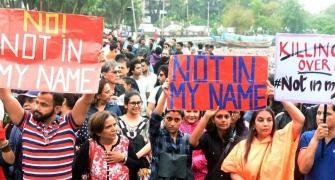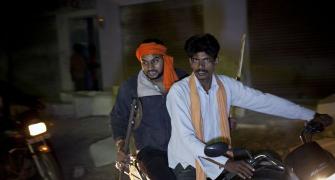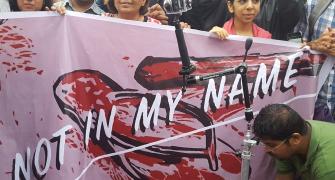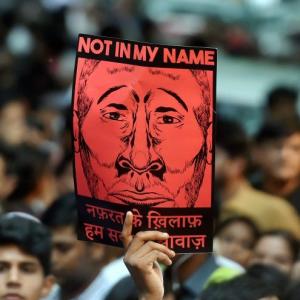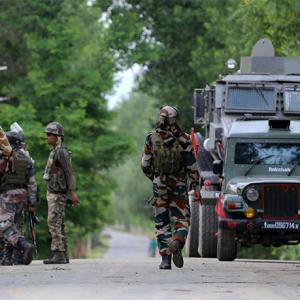'The prime minister has merely paid lip service condemning these crimes instead of launching a massive crackdown against such brutalities,' argues Professor Mohammad Sajjad.
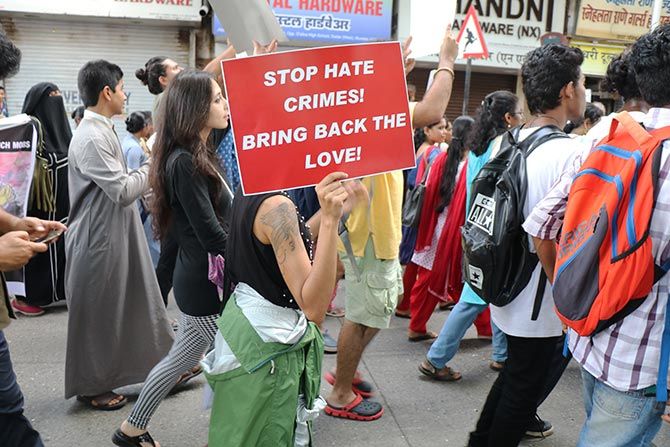
On June 22, 2017, 16-year-old Junaid -- a native of a village near Ballabhgarh Haryana, in the vicinity of the national capital Delhi -- was lynched within a crowded bogey of a passenger train from Delhi to Mathura.
This time, the deceased and the surviving victims did not have even that 'incendiary' and 'provocative' item called beef on them; absolutely no such edibles.
As in the case of Akhlaq Saifi of Dadri, Uttar Pradesh -- who was lynched by a mob in September 2015 -- there was no beef here.
Certain sections of the nation were outraged. No sooner had the 'burden' of the outrage of Junaid's murder begun to diminish, on June 28, 2017, another spine-chilling report came in from a village near Giridih, Jharkhand.
A cow owned by a Muslim dairy farmer, Usman Ansari, died of illness. Soon after the cow's death, a mob of around 1,000 people appeared on the spot.
One of the anti-social elements from among the crowd slit the cow's throat and alleged that Ansari had killed it for beef.
This in itself testifies how well pre-planned this was. Usman was thrashed, and his house was set on fire.
The police, (and its intelligence gathering), as usual, keeping itself oblivious of the bloody plans of the thuggish 'cow protectors', reached the spot only after Usman's house was burnt down.
Jharkhand's additional director general of police claimed the mob did not allow the police to take Ansari to the hospital.
This crime was followed by another such lynching of a Muslim in Ramgarh, near Ranchi, also in Jharkhand.
In May 2017, residents of a village near Jamshedpur, Jharkhand, were lynched. They were alleged to be child lifters though no instance of child lifting could be traced.
Various parts of Jharkhand are witnessing such horrific crimes without adequate action by the police to bring a deterrence effect.
Jamshedpur, Ranchi-Hatia, Hazaribagh, Giridih, etc in Jharkhand have a long history of communal violence.
There is a pressing need to comprehend the anatomy and pathology of the recent spurt of anti-Muslim lynchings in India.
Criminal agencies don't seem to act the way they should, and in certain instances (Akhlaq Saifi of Dadri) the deceased have posthumously been slapped with a case.
This impression of seeming State patronage for these lynch mobs gets strength once you don't hear or see unqualified words of condemnation of lynching coming from the ministers of the government and high functionaries of the governing party.
Over a period of time, ideological groups have indoctrinated significant segments of the masses to hate religious minorities and other marginalised communities.
There is anger, hatred against the 'Other'.
Persecution, exclusion, and alienation are being inflicted systematically and constantly, tearing asunder the very fabric of India.
Incidentally, the lynching of blacks in the USA and Hindu-Muslim strife, mostly around the cow in India, began from the 1880s onwards.
In subsequent decades, 1920s downwards, competitive communalism grew further, prodded by the colonial State.
Yet, even in nationalist historiographies, only the Muslims were blamed for India's Partition, as if the likes of the Hindu Mahasabha had no role to play! As if the Muslim League and India's Muslims were synonymous.
This is how the Muslims have been vilified and 'Otherised', not only by the reactionary forces, but also by the forces of liberalism.
In the US, a spurt in lynching began after black slaves secured freedom. Lynchings became a popular way of resolving the anger that whites had about the freed blacks.
A few states -- Mississippi, Georgia and Texas -- registered a higher number of lynchings than other American states.
Just as in today's India, certain provinces such as Haryana, Jharkhand, Rajasthan and Uttar Pradesh have witnessed recurrent lynchings and other such heinous crimes.
These provinces are governed by the Bharatiya Janata Party which also governs the federal Union of the provinces.
Muslims are being killed on the streets, in trains, in their homes only for being Muslims.
Quite a significant segment of television news channels in India have exposed themselves by choosing to be on the side of the State which appears to be providing impunity to the thugs.
The prime minister has merely paid lip service condemning these crimes instead of launching a massive crackdown against such brutalities.
Spokespersons of the governing party have no compunction in declaring that civil society's protests against the lynchings are a seditious act funded by enemy countries.
And the lone Muslim minster in the Modi Cabinet says Muslims have no fear in India.
This has pushed Muslims to the wall. Scared, hapless, and helpless!
Various shades of Muslim leadership have no guts to ask non-BJP leaders to come out on the streets along with their core support base.
These Muslim leaders are not asking why Nitish Kumar, Lalu Yadav, Mulayam Singh Yadav, Mayawati, with their respective core support base, do not come out on the streets to protest these lynching of other Indians.
Other Muslim leaders -- accomplished individuals of the Muslim middle class who believe they owe their high offices to the regime -- were busy hosting iftar parties.
Yet another kind of Muslim leadership, the clergy, tried to dissipate the protest by issuing a covert fatwa that wearing black badges could spoil Eid prayers.
Indians were outraged in December 2012 when a young woman was brutally gang-raped in Delhi. This outrage led to a harsher law against such crimes against women.
But no one has yet asked for tough laws against the lynch mobs nor are enough Indians asking the regime to act as per the existing laws. The judiciary too has not taken suo motu cognisance of such horrors.
So, how do we rescue the Republic from these bloodthirsty thugs?
How do we reclaim the beautiful pluralistic and harmonious civilisational character of India?
Hope lies in the united assertion of sane citizens who surely outnumber the minuscule minority of alleged 'gau rakshaks'.
A small segment of Muslims have reduced their poverty through various ways including employment, mostly blue collar, since the 1980s, in Gulf countries.
In this 'age of anger', hatred and violence are stored in human minds. If somebody improves her or his economic or educational profile, she or he becomes an eyesore in the neighbourhood.
This is one reason why hate-based organisations mushroom, swelled by unemployed youth, due to rural distress and growing inequalities.
Earlier, they were mere hoodlums, lumpen and criminals. Now these are the rank and file of certain organisations.
State inaction or encouragement accentuates it manifold.
This is the real challenge facing Indian society, which badly needs leaders with equanimity, compassion and determination to deal with all such cankers.
Before capturing power at the hustings, these leaders have to do it in the courts of law, on the streets, inside media houses, and even more importantly, through much more vigorous cross-cultural interactions at popular levels, in villages, mohallas, towns, cities, university campuses, and in multi-religious working spaces (where Muslims are even more under-represented), and also inside train coaches.
They are already too late.
Wake up, India, before it is ruined further, beyond redemption!
Professor Mohammad Sajjad is at the Centre of Advanced Study in History at Aligarh Muslim University. He is the author of Muslim Politics in Bihar: Changing Contours (Routledge, 2014) ands Contesting Colonialism and Separatism: Muslims of Muzaffarpur since 1857 (Primus, 2014)
IMAGE: A protest against targeted lynchings, Mumbai, July 3, 2017. Photograph: Uttam Ghosh/Rediff.com

